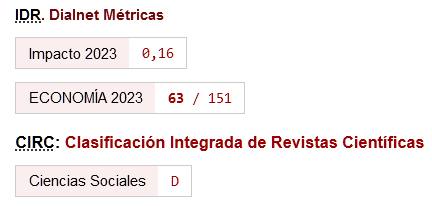La crisis del euro y su futuro
Palabras clave:
euro, crisis, ocaso, ruptura, alternativasResumen
En este artículo se analiza la reciente crisis del euro, sus causas y sus consecuencias, así como hacia donde nos conducen previsiblemente las posibles alternativas que se dibujan como salida de la misma: desde una mayor integración real de la unión económica y monetaria a su posible ruptura en un grado mayor o menor.
Descargas
Citas
Artus, Patrick (2011): "Taux de change de l'euro et désindustrialisation", Flash Economie. Recherche Économique. Natixis, nº 302.
Artus, Patrick (2013): "The paradox of the eurozone crisis: It has not led to a correction of heterogeneity through an adjustment of costs; it has intensified heterogeneity through a relocation of production activity", Flash Economics. Economic Research. Natixis, nº 472,.
Artus, Patrick et Castillo, Jesús (2012): "Le calcul de l'Espagne", Flash Economie. Recherche Economique. Natixis, nº 500.
Auerback, Marshall (2011): "A United States of Europe or Full Exit from the Euro?", International Journal of Political Economy, vol. 39, nº 4, Winter, pp. 87-102. https://doi.org/10.2753/IJP0891-1916390404
Bagnai, Alberto (2012): Il tramonto dell'euro. Come e perché la fine de la moneta unica salverebbe democracia e benessere in Europa, Reggio Emilia: Imprimatur editore.
Barba, Aldo and De Vivo, Giancarlo (2013): "Flawed currency areas and viable currency areas: external imbalances and public finance in the time of the euro", Contributions to Political Economy, 32, pp. 73-95. https://doi.org/10.1093/cpe/bzt003
Bibow, Jörg (2012): "The Euro Debt Crisis and Germany's Euro Trilemma", Working Paper, Levy Economics Institute of Bard College, nº 721. https://doi.org/10.2139/ssrn.2060325
Blankenburg, Stephanie; King, Lawrence; Konzelmann, Sue; Wilkinson, Frank (2013): "Prospects for the eurozone", Cambridge Journal of Economics, 37, pp. 466-477. https://doi.org/10.1093/cje/bet015
Blyth, Mark, (2013): Austerity. The History of a Dangerous Idea, New York: Oxford University Press.
Bolkenstein, Frits (2013): "Bolkestein: i paesi tripla-A introducano una valuta parallela", Voci dalla Germania, Martedi, 8 ottobre (http://vocidallagermania.blogspot.com.es/2013/10/bolkestein-i-paesi-tripla-introducano.html).
Bootle, Roger (2012): "Leaving the euro: A practical guide", Capital Economics, London.
Brancaccio, Emiliano and Realfonzo, Riccardo., (promotores) (2013): "The economists' warning", Financial Times, September 23.
Bricall, Josep M. (2013): "Los problemas de la moneda común europea" en Bricall, Josep M. (2013): Cinco ensayos sobre la crisis y sus consecuencias para el estado del bienestar, Barcelona: RBA, pp. 157-207.
Chen, Ruo et al. (2012): "External Imbalances in the Euro Area", IMF Working Paper, WP/12/236, September. https://doi.org/10.5089/9781475524673.001
Corsi, Marcella e Guarini, Giulio (2010): "Le cause reali delle crisi finanziarie: l'approccio di Paolo Sylos Labini", Studi e Note di Economia, Anno XV, nº 3, pp 389-412.
De Grauwe, Paul (2011a): "The Governance of a Fragile Eurozone", CEPS Working Documents, nº 346, May. https://doi.org/10.2139/ssrn.1898618
De Grauwe, Paul (2011b): "Managing a Fragile Eurozone", CESifo Forum 2, pp.40-45. https://doi.org/10.1111/j.1467-8462.2012.00691.x
De Grauwe, Paul (2011c): "The European Central Bank: Lender of Last Resort in the Government Bond Markets", CESifo Working Paper, nº 3569, September. https://doi.org/10.2139/ssrn.1927783
De Grauwe, Paul (2011d): "European Monetary Union", in Eds. Durlauf, S. N. and Blume, L. E.: The New Palgrave Dictionary of Economics, Online Edition:, Palgrave Macmillan, 05 October.
https://doi.org/10.1057/978-1-349-95121-5_2011-2
De Grauwe, Paul (2013a): "Design Failures in the Eurozone: Can they be fixed?", LEQS PaperNº 57, The London School of Economics and Political Science, February. https://doi.org/10.2139/ssrn.2215762
De Grauwe, Paul (2013b): "Pool debt, or face dangerous upheavals across Europe", Friends of Europe, March.
De Grauwe, Paul (2013c): "Design Failures, in the Eurozone -can they be fixed?", European Economy, Economic Papers, 491, April, European Commission. https://doi.org/10.2139/ssrn.2215762
De Grauwe, Paul and Ji, Yuemei., (2013a): "More evidence that financial markets imposed excessive austerity in the eurozone", CEPS Commentary, February 5th.
De Grauwe, Paul and Ji, Yuemei (2013b): "Panic-driven austerity in the Eurozone and its implications" Voxeu, February 21st.
De Grauwe, Paul and Ji, Yuemei (2013c): "The Legacy of Austerity in the Eurozone", CEPS Commentary, 4 October.
Dor, Eric (2013): "The launch of the euro brought about an impressive decrease of manufacturing in France and huge losses of market shares" IESEG Working Papers Series, ECO-07, June.
Dornbusch, Roger (1996): "Euro Fantasies: Common Currency as Panacea", Foreign Affairs, Vol. 75, nº 5, pp 110-124, September-October. https://doi.org/10.2307/20047747
European Solidarity Manifesto (2013): "European Solidarity in the face of the eurozone crisis: Controlled Segmentation of the Eurozone in order to Preserve the Most Valuable Achievements of European Integration", European Solidarity Manifesto, Brussels, 24th January (http://european-solidarity.eu/esm.php).
Feldstein, Martin (1997): "EMU and International Conflict", Foreign Affairs, vol. 76, nº 6, pp 60-73, November-December. https://doi.org/10.2307/20048276
Fitoussi, Jean-Paul (2013): Le théorème du lampadaire, Paris: Éditions les Liens Qui Libérent.
Fitoussi, Jean-Paul., Saraceno, Francesco (2010): "Inequality and Macroeconomic Performance", OFCE/POLHIA Nº 2010-13, July.
Fitoussi, Jean-Paul and Saraceno, Francesco (2013): "European economic governance: the Berlin-Washington consensus", Cambridge Journal of Economics, 37, pp. 479-496.
https://doi.org/10.1093/cje/bet003
Frenkel, Roberto and Rapetti, Martin (2009): "A developing Country View of the Current Global Crisis: What Should Not Be Forgotten And What Should Be Done", Cambridge Journal of Economics, 33 (4), pp. 685-702. https://doi.org/10.1093/cje/bep029
Galí, Jordi (2012): "Entrevista" por Trillas, Ariadna, Diari ARA, 2 de juliol (http://www.ara.cat/economia/Jordi_Gali-CREI-crisi-euro-UE-Grecia-Keynes-sistema_financer_0_710929121.html).
Gave, Charles (2013): "Europe: The Last Great Potemkin Village Where "The Rich Get Richer", And Poor Get Poorer'", GKResearch, Zero Hedge, February 10th.
Godley, Wynne (1992): "Maastricht and All That", London Review of Books, Vol 14, Nº 19, October, pp.3-4.
Godley, Wynne and Izurieta, Alex (2004): "Balances, Imbalances and Fiscal Targets. A New Cambridge View", CERF and UNDP.
Godley Wynne.and Lavoie Marc (2007): "A Simple Model of Three Economies with Two Currencies: The Eurozone and the USA", Cambridge Journal of Economics, 31, pp. 1-23.
https://doi.org/10.1093/cje/bel010
Gutiérrez, Eduardo, Ayala, Iván H., Albarracín, Daniel, Montes, Pedro: (2012): Qué hacemos con el euro, Madrid, Akal.
Hannsgen, Greg and Papadimitriou, Dimitri B. (2012): "Fiscal Traps and Macro Policy After the Eurozone Crisis", Public Policy Brief, nº 127, Levy Economics Institute of Bard College.
Hein, Eckhard (2012): "Finance-dominated capitalism, re-distribution and the financial and economic crises: A European perspective", Working Paper Institute for International Political Economy, No. 14/2012, Berlin.
Jorung, Lars and Drea, Eoin (2009): "The Euro: It can't happen, It's a bad idea, It won't last. US Economists on the EMU, 1989-2002", European Economy, Economic Papers, nº 395, European Commission.
Kaldor, Nicholas (1971): "The Dynamics effects of the Common Market", The New Statesman, March 12th, reprinted in Kaldor Nicholas: Further Essays On Applied Economics, volume 6 of the Collected Economic Essays series, Chapter 12, pp 187-220.
Kawalec, Stephan and Pytlarczyk, Ernest (2013): "Controlled dismantlement of the Eurozone: A proposal for a New European Monetary System and a new role for the European Central Bank", National Bank of Poland, Working Paper nº 155. https://doi.org/10.2139/ssrn.2320440
Kelton, Stephanie A. and Wray, L. Randall (2009): "Can Euroland Survive?", Public Policy Brief, ,Nº 106, November, Levy Economics Institute of Bard College.
Kregel, Jan (2011): "Debtors' crisis or creditors' crisis? Who pays for the European sovereign and subprime mortgage losses", Public Policy Brief, nº 121, Levy Economics Institute of Bard College.
Krueger, Allan B. (2012): "The Rise and Consequences of Inequality in the United States", Center for American Progress, January 12.
Krugman, Paul (1998): "The euro: beware of what you wish for" in http://web.mit.edu/krugman/www/euronote.html.
Lavoie, Marc (2011): "The monetary and fiscal nexus of neo-chartalism: A friendly critical look", Department of Economics, University of Ottawa, October.
Lynn, Matthew (2012): "6 Reasons Spain will leave the euro first", Market Watch. The Wall Street Journal, May 30.
Mateo, Juan Pablo y Montero, Alberto (2012): Las finanzas y la crisis del euro. Colapso de la eurozona, Madrid: Editorial Popular.
Martín Seco, Juan Francisco (2013): Contra el euro. Historia de una ratonera, Barcelona: Península.
Meade, James E. (1957): "The Balance-of-Payments Problems of a European Free-Trade Area", The Economic Journal, 67, pp. 379-396. https://doi.org/10.2307/2227357
Montes, Pedro (2001): La historia inacabada del euro, Madrid: Trotta.
Mundell, Robert (1961): "A Theory of Optimum Currency Areas", American Economic Review, 51, pp. 657-665.
Nordvig, Jens J. (2013): The Fall of the Euro. Reinventing the Eurozone and the Future of Global Investing, New York: MacGrawHill.
Papadimitriou, Dimitri B. and Wray, L. Randall (2011): "Euroland in Crisis as the Global Meltdown Picks Up Speed", Working PaperNo. 693, October, Levy Economics Institute of Bard College .
https://doi.org/10.2139/ssrn.1946381
Papadimitriou, Dimitri B. and, Wray, L. Randall (2012): "Euroland's Original Sin", Policy Note, nº 8, Levy Economics Institute of Bard College.
Papadimitriou, Dimitri. B. et al.(2013): "The Greek Economic Crisis and the Experience of Austerity. A Strategic Analysis", Strategic Analysis, July, The Levy Economics Institute of Bard College.
Pasinetti, Luigi L. (2000): "Public Debt in the European Union Countries: Two ways of facing the problem" in Krishnakumar, Jaya and Ronchetti, Elvezio, edited by: Panel Data Econometrics: future Directions. Papers in Honour of professor Pietro Balestra, Amsterdam: Elsevier, pp. 317-327.
Pivetti, Massimo (2013): "On the gloomy European project: an introduction", Contributions to Political Economy, 32, pp. 1-10.
https://doi.org/10.1093/cpe/bzt002
Rajan, Raghuram. G. (2010): Fault Lines: How Hidden Fractures Still Threaten the World Economy, New Jersey, Princenton University Press.
https://doi.org/10.1515/9781400839803
Riera, Miguel (2012): ¿Salir del euro?. Preguntas (y respuestas) más frecuentes, El Viejo Topo.
Rodrik, Dani (2011): The Globalisation Paradox. Democracy and the Future of the World Economy, New York, W. W. Norton & Company. https://doi.org/10.1355/ae28-3k
Sapir, Jacques., (2011): "S'il faut sortir de l'Euro...", Document de Travail, Cermi-Ehess, 6 d'avril.
Scharpf, Fritz W. (2011): "Monetary Union, Fiscal Crisis and the Preemption of Democracy", MPlfG Discussion Paper, 11, Max-Planck-Institut Für Gesellschaftsforschung.
https://doi.org/10.2139/ssrn.1852316
Soy, Antoni (2001): "La Unió Econòmica Europea i el euro", en Soy, Antoni (2001): Economia Política i sobiranisme, Barcelona: Editorial Mediterrània, pp. 137-167.
Soy Antoni (2013): Sortir de l'euro per sortir de la crisi? Europa y Catalunya devant la crisi financera i la crisi de l'euro, Barcelona: Viena Edicions.
Stockhammer, Engelbert (2012): "Rising Inequality as a Root Cause of the Present Crisis", PERI Working Paper Series, num. 282, April.
Sylos Labini, Piero (2003): "Le prospettive dell'economia mondiale", Moneta e Credito, nº 223, pp 267-295.
Tepper, Jonathan (2012): "A primer on the Euro breakup: default, exit and devaluation as the optimal solution", Variant Perception, Febraury.
Tilford, Simon (2012): "Economic Recovery Requires a Better Deal for Labour", Centre for European Reform, November.
Tobin, James (1963): "Deficit, Deficit, Who's Got the Deficit?," The New Republic, Vol. 148, Issue 3, pp 10.
Torrero, Antonio (1996): "El esfuerzo de convergencia nominal para el conjunto de la economía española", Información Comercial Española, núm. 756, agosto-septiembre, pp. 51-60. Incluido como "Consecuencias del esfuerzo de convergencia nominal para el conjunto de la economía española" en Colino, José y García, Javier (Directores) (1998): España y Maastricht: ventajas e inconvenientes, Madrid: Editorial Civitas, pp. 155-174.
Treeck, Till van (2012): "Did inequality Cause the US Financial Crisis?", Working Paper IMK, nº 91, April.
Wolf, Martin (2012): "What was Spain supposed to have done?", Martin Wolf's Exchange Blog, Financial Times, June 25th.
Woo, David and Vamvakidis, Athanasios (2012): "Game Theory and Euro Breakup Risk Premium", Bank of America Merrill Lynch, July 10th.
Wray, Randall L. (2009): "The rise and fall of money manager capitalism: a Minskian approach", Cambridge Journal of Economics, 33, pp. 807-828. https://doi.org/10.1093/cje/bep024
Zezza, Gennaro (2012): "The impact of fiscal austerity in the Eurozone", Review of Keynesian Economics, Inaugural Issue, Autumn, pp. 37-54. https://doi.org/10.4337/roke.2012.01.03
Descargas
Publicado
Cómo citar
Número
Sección
Licencia
Esta licencia permite a terceros compartir (copiar y redistribuir el material en cualquier medio o formato) y adaptar (remezclar, transformar y crear a partir del material para cualquier finalidad, incluso comercial), siempre que se reconozca la autoría y la primera publicación en esta revista (La Revista, DOI de la obra), se proporcione un enlace a la licencia y se indique si se han realizado cambios en la obra.







